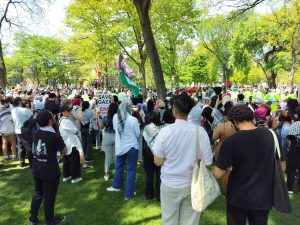We of the MRT and Esquerda Diário repudiate the commemoration of the military coup of 1964: We do not forget and we do not forgive! We demand the repeal of the Amnesty Law of 1979, which maintains impunity for the dictatorship’s murderers and torturers, as well as the trial and punishment of all civilian and military officials in the dictatorship! More than ever we must fight for the unrestricted opening of all the classified files and documents on the military’s crimes.
The military high command always kept alive the traditions of ’64, but until the Bolsonaro government came to power, the celebrations were restricted to the barracks, and when some reserve general or military club tried to leave the shadows, they were almost universally criticized.
Now in 2019 the celebrations for the military coup of 1964 are once again official, encouraged by Bolsonaro, Joice Hasselmann [a right-wing journalist and member of Bolsonaro’s party] and the far right in government, to the point that the generals themselves (enthusiastic supporters of the military coup of ’64) pleaded for moderation in celebrations.
This celebration, it should be remembered, comes in the wake of Bolsonaro’s tributes to torturers throughout Latin America, such as the dictator Alfredo Stroessner of Paraguay and Pinochet of Chile. These dictatorial servants of Washington are “inspiring statesmen” for Bolsonaro, who today serves as the main pillar for Trump’s re-colonizing offensive in the region, and for his attempted coup in Venezuela.
According to General Rêgo Barros, official spokesman for the presidency, “The president does not consider March 31, 1964 a military coup.” That is, according to Bolsonaro, the civil society and the military, “realizing the danger” that the country was experiencing at that moment, united to “recover and set our country on the right path again.” He added, “If that had not happened, today we would have some kind of government here that would not be good for anyone.”
It is no wonder that Bolsonaro has as a bedside book “A verdade sufocada” (The truth suffocated), written by the torturer colonel Carlos Alberto Brilhante Ustra, whom the president honored during the impeachment session [against Dilma Rousseff] in 2016 in the House, and who commanded Doi-Codi [a Brazilian intelligence and repression agency] in São Paulo, where dozens of political prisoners were murdered.
Whether in Bolsonaro’s most radical version or in the more “moderate” version of the high command, the justification for the military coup (which he claims was not a coup) is the same. Bolsonaro sometimes names the danger “communism,” or subversion. General Mourão [Brazil’s Vice President] refers to the repression as an “internal war” and maintains that there were excesses committed “on both sides.” Dilma’s truth commission, which so irritated the military, ended in melancholy, doomed to irrelevance from the moment she gave up punishing the dictatorship’s murderers and torturers.
Although the Dilma government officially directed military commanders in 2011 to suspend any activity commemorating the coup of ’64 in the military units, the PT preserved the impunity of the dictatorship’s civilian and military officials (maintaining the Amnesty Law of 1979, which in fact ensures the impunity of the state).
Now lies have gained the status of official government doctrine, and there are generals who want to remove any reference to the coup or military dictatorship from school books, in the same spirit of censorship as that of “school without party,” a project that aims to prevent teachers from speaking freely in the classroom.
A Bourgeois Coup d’État Against the Workers
The enemy of the coup was the people themselves, the working and peasant masses who radicalized their struggles, especially the struggle for agrarian reform and the strengthening of peasant leagues, which was a form of peasant organization that grew from the Northeast of the country. This process reached the Armed Forces, the sergeants of the Army and the Navy, where the sailors were organizing themselves in an association of their own. The attack on the “democratic order” came precisely from the civic-military plot that led to the 1964 military coup, openly sponsored by the U.S. Embassy, the State Department and the FBI, to end the working masses organizing that had begun to emerge, and subordinate Brazil to its foreign policy.
The government of Joao Goulart [the president overthrown in 1964] had not been communist at all. What displeased the United States was that it maintained a nonalignment policy with the U.S., refused to break diplomatic relations with Cuba and did not join the inter-American force that the United States wanted to create, and for which they established a war college in Panama, where they sought to instill in the region’s armed forces the view that the greatest enemy was internal, that is, the working masses who could rebel against exploitation and imperialist domination following the example of the Cuban people after the Revolution of 1959.
But Goulart feared the rebellion and revolutionary tendencies of the Brazilian people themselves more than he feared the U.S.-backed military dictatorship. Despite having more than 70% popular approval on the eve of the coup, he took no real measure of resistance. Not even the Communist Party (PCB), which had a major influence on trade unions, student organizations and even the Armed Forces, took any action to counter the coup. The staff of the Armed Forces and the United States—which moved warships, including an aircraft carrier, to support the coup—contemplated the possibility of a protracted civil war, but there was not even one day of resistance.
While officially the death toll for the dictatorship is about 450, the number is much higher if we count the mass murders, true genocide of indigenous populations, which exceed 8,000 deaths, or of peasants, which is over 1,200 deaths. It would be necessary to add also the bones of the clandestine cemetery of Perus. An actual “truth commission,” with access to all the documents of the Armed Forces and the intelligence agencies, would reveal many more barbaric crimes committed by the dictatorship.
As part of the dictatorship’s political persecution, the press was censored, trade unions suffered intervention, the peasant leagues were decimated and the Armed Forces suffered a purge. With “Institutional Act #5”, also known as AI-5 in 1968, the dictatorship radicalized political repression and regime closure.
The lie of Mourão and the military that it was a war and “excesses were committed on both sides” has to be unmasked. The guerrillas who fought the dictatorship, especially after AI-5, were a handful of poorly armed and ill-equipped militants. They cannot be compared with the state’s armed forces, police and intelligence agencies. The repressive apparatus was aimed at attacking all forms of working-class and popular organization.
“Economic Miracle” or Increased Subordination to Foreign Capital?
The economic work of the dictatorship, which is sometimes supported by sectors of people who oppose the military dictatorship, also needs to be unmasked. There was a reason why the unions were under tight control by the military and the clandestine leftist organizations experienced heavy repression.
The so-called “economic miracle” was supported by the multiplication of the fraudulent Brazilian foreign debt and the country’s increased dependence on foreign capital (well paid by all the military), a huge attack on wages and an increase in the pace of factory work, an unprecedented opening to the interests of multinationals and imperialism, and major infrastructure works such as the Itaipu dam, or the unfinished trans-Amazon highway, also became centers of work-related accidents and cemeteries of workers who died by the thousands.
In addition, many cases of corruption involve dictators, torturers and their business friends, as we have shown here in Esquerda Diário. The assassins of the dictatorship, contrary to what the military, Bolsonaro and Mourão preach, were always muddled in the filth of corruption, bribes and impunity, leaving a nefarious legacy for the decades to come.
Nothing good has resulted for the working class, the peasants and the poor Brazilian people of the military governments. At the end of the so-called economic miracle, Brazil entered one of the biggest recessions of its history.
Judgment and Punishment of All Civil and Military Officials for the Dictatorship!
In resuming the official commemorations of the military coup, Bolsonaro has made his intention evident. He calls for repression, torture and political assassinations, to implement his economic plan, which is even more brutal than that of the dictatorship itself, to end retirement and to attack basic entitlements like vacations and the 13th salary (Brazilians get paid for an extra month in December), ending the rights provided in the CLT for future generations and delivering all public equity to multinational companies.
We of the MRT and Esquerda Diário consider it an obligation of the trade union centrals (first and foremost the CUT and CTB), student organizations (such as UNE) and human rights organizations, as well as PT and PSOL, to unite to organize demonstrations in order to repudiate Bolsonaro and the coup plotters of today and yesterday, coordinating this mobilization with the organizing against the pension reform.










